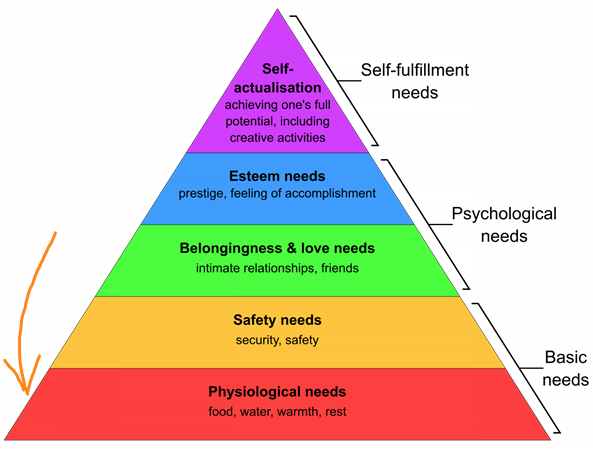Are Neurodivergents with ADHD and Autism Unable to Achieve Self Actualisation?
My Guinea Pig Henrietta and I explore the implications of Maslow's Hierarchy of Needs, and how Neurodivergents are getting stuck at each level of the pyramid
Me: Hey Henrietta, do you know about Maslow’s Hierarchy of Needs?
H: Wheek wheek
Me: No? Do you know Abraham Maslow, the famous humanist psychologist?
Me: *Looks up* The moustache man who looks like Mario?
Me: Yes that’s him! Back in the 1940s and 1950s, Maslow became famous for framing our human needs as a pyramid, consisting of a layered hierarchy, with our basic needs at the bottom and self-actualisation at the top.
According to Maslow, we must successfully meet the needs within each level before we can reach self actualisation at the top. If we get stuck at any of these levels, we cannot progress further up the pyramid.
H: What’s Self Acshwalisashon?
Me: Self-actualisation, Henrietta, is the highest point, the pinnacle of Maslow’s pyramid. It is tapping into our full potential, being our most authentic selves, and discovering a deeper purpose in life. It is the ultimate goal of personal growth. Let us remember that when we reach this point, we become happier, more creative, self-aware, and fulfilled, which naturally leads to healthier relationships and a stronger sense of community.
H: Lettuce, I love lettuce. You got any?
Me: No Henrietta I don’t.
H: Oh
Me: Henrietta, the implications for this are fascinating and alarming. Like many marginalised people , Neurodivergents with Autism and ADHD face challenges at each level, which means they get stuck there so that they are unable to progress!
H: Like Mario Brothers! You always get stuck at Level 7
Me: Yes I do. There are far fewer levels in Maslow’s pyramids than Mario Brothers, but the consequence of being stuck in Maslow’s levels is much worse than the game- it means we may never find true authentic happiness and fulfilment. . .
H: Oh that is sad. And now I must cheer myself up by finding the half eaten carrot I hid this morning *waddles off*
Me: Ok Henrietta, good luck and see you soon!
Level One: Physiological Needs
The physiological stage of Maslow’s hierarchy is about meeting our basic needs such as sleep, food, hydration, and physical health. However, many Neurodivergents with Autism and ADHD struggle to meet these needs due to unique challenges. Insomnia is common among ADHDers, often caused by racing thoughts (such as remembering that embarrassing thing you did when you were 12) delayed sleep phase syndrome (where the sleep-wake cycle is shifted to later hours) and disrupted circadian rhythms, making it more challenging to maintain a healthy sleep schedule. This chronic lack of rest can severely impact overall well-being, undermining our ability to meet basic physiological needs.
50-60% of autistic people experience alexithymia, which is difficulty identifying and describing emotions. This challenge often extends to interoception—the awareness of internal bodily cues—making it harder to recognise signals like hunger, thirst, or fatigue, potentially leading to overlooked health needs.
Nutrition can also be an issue. Avoidant/Restrictive Food Intake Disorder (ARFID) is common among autistic individuals, leading to food aversions based on texture, taste, or smell. For ADHDers, executive dysfunction can make cooking, meal prepping, and eating regularly feel overwhelming, leading to unhealthy eating habits.
Sensory overwhelm, particularly in public spaces like supermarkets or gyms, can limit access to healthy food and exercise.
ADHD is strongly correlated with excessive drinking and drug use and smoking, which is of course not great for our health.
Level 2: Safety Needs
Many Neurodivergents with Autism and ADHD struggle to progress beyond the first stage of Maslow’s hierarchy of needs because of a constant sense of feeling unsafe. Overwhelm, sensory sensitivities, and sensory bombardment can make everyday environments feel hostile, leaving us in a frequent state of heightened alertness.
Social anxiety, hypervigilance, and difficulties interpreting social cues often lead to fear of rejection or judgment, increasing a sense of vulnerability. Emotional flashbacks—common among traumatised Neurodivergents—can cause intense distress, as they relive past experiences of trauma or abuse. Autistic individuals, in particular, may have vivid and persistent emotional flashbacks due to heightened sensory processing. Furthermore, their heightened sensory processing and stress responses means that Autistic individuals have increased vulnerability to traumatic experiences. Unfortunately, many Neurodivergents experience high rates of trauma, bullying, and abuse during childhood and adulthood, reinforcing feelings of unsafety and mistrust in others. For ADHDers, impulsivity and difficulties with emotional regulation may lead to risky situations, further jeopardising safety and security. The cumulative effects of these challenges often prevent Neurodivergents from achieving emotional stability, feeling physically secure, or trusting their surroundings, which are all necessary to progress toward the next level of belonging and self-esteem.
Level 3: Belongingness and Love Needs
Many neurodivergent individuals (NDs) with Autism and ADHD struggle to progress beyond the belongingness and love stage of Maslow’s hierarchy due to significant challenges with social connection. Difficulties with social interactions, such as misinterpreting social cues, struggling with communication styles, or being misunderstood, can lead to feelings of exclusion and rejection. Rejection Sensitive Dysphoria (RSD) intensifies the fear of rejection, making relationships feel insecure and difficult. RSD is an intensely unpleasant and debilitating emotional sensitivity that many people with ADHD experience when we feel we have been rejected, criticised or not meeting expectations. An RSD episode can be triggered by so many things that might seem insignificant or silly to a neurotypical person. A sense that someone's tone is off, not receiving a reply to texts (even though we often forget to text back, what hypocrites we are 😆), no emojis in texts, not being invited to a party and being picked last for teams are just some examples of triggers that can lead us to a full blown RSD episode.
Many of us mask, which is hiding our authentic selves to appear more acceptable. Suppressing our traits and adapting to neurotypical expectations can leave us feeling unseen, disconnected, and anxious that our mask will slip. When we mask , any relationships we form may feel inauthentic, because our true self is not involved in the connection.
Neurodivergents often feel like we don’t belong here in this world. We feel disconnected in our friendships and in society as a whole. I have had countless conversations with other Neurodivergents in my communities where we talk about how we feel like we are aliens in this world.
Unfortunately, most of us lack a community of like-minded people who truly value our differences, leaving us without shared spaces or peers who understand our experiences. This absence of an accepting support network can heighten our sense of isolation, making it harder to progress beyond belongingness and love. Without genuine belonging—built on authenticity and mutual understanding—we remain unable to move to the higher stages towards growth and self-actualisation.
Level 4: Esteem Needs
Many of us Neurodivergents struggle because the way in which we are perceived by society tends to be in terms of our deficits. The deficit model of ADHD and Autism focusses on our impairments rather than our strengths, leaving our creativity, empathy, and unique perspectives and other many strengths unrecognised and unvalued.
Without workplace accommodations, we often face reduced productivity and higher rates of burnout. We also encounter barriers to fitting in socially at work, which can lead to fewer opportunities for promotions or recognition. The result is a vicious cycle: low self-esteem stemming from workplace struggles makes it harder to advocate for ourselves to request accommodations or highlight our talents, perpetuating the lack of esteem and wearing away at our motivation. This stalled progression can cause us to remain stuck and not reach the final level- self-actualisation, where we might otherwise embrace our authentic selves and fully contribute our gifts to the world.
Level 5: Self Actualisation
Here we are, the final level! Despite all odds, the Neurodivergent has passed through all the levels and now is ready to enjoy all the happiness and fulfilment that comes with self-actualisation.
Yay!
I don’t want to be a Debbie Downer, but we’re not there yet. We are ready for self actualisation but we have not achieved that. To do this we may need support. Someone to guide us through to the pinnacle.
Unfortunately, neurodivergents often face significant barriers to accessing support and therapy, which can stall progress toward self-actualisation. Financial constraints may put specialised therapeutic services out of reach. Moreover, finding therapists who truly understand neurodivergence can be challenging. Therapists may lack training in adapting therapeutic approaches to autistic or ADHD clients’ distinct needs. The lack of neuroinclusivity in counselling training means that we have likely lost many potentially excellent neurodivergent therapists.
When we do find therapy, overwhelm can arise from having to articulate complex sensory or emotional experiences in a system that isn’t built for ND communication styles. Lengthy referral times, burdensome paperwork, and limited appointment availability often exacerbate stress. Compounding this, certain approaches can inadvertently harm ND clients by disregarding our unique neurology. For instance, therapies that push masking or seek to “fix” ND traits can reinforce shame, rather than improve self-esteem.
Ultimately, without accessible, knowledgeable, and neurodiversity-affirming support, it becomes far harder for us Neurodivergents to move beyond foundational and esteem needs toward self-actualisation, where our fabulous authenticity and personal growth fully flourish.
H: I’m back! What did I miss?
Me: You missed quite a bit . And so is the missing out, world sadly…
H: What’s that you said= celery?
Me: You are a funny piggy aren’t you. Ok I’m -we’re- nearly done here
The World is Missing Out
When Neurodivergents don’t reach self-actualisation, it means missed chances for innovation, creativity, and fresh perspectives in workplaces and communities. If society doesn’t provide proper accommodations or genuinely neuroinclusive environments, we risk losing a wealth of unique talents. This lack of support can worsen mental health issues, fuelling chronic stress, burnout, and mental health crises. Systemic barriers—such as inaccessible workplaces and deficit-focused ways of seeing neurodivergence—end up reinforcing stigma and deepening inequalities, which ultimately chips away at social cohesion.
Me: Ok we’re done now Henrietta. How’s the carrot by the way, did you find it?
H: Wheek
Me: Gannet
Are you in the UK and looking to get an ADHD diagnosis? Getting one in the UK is ridiculous -insane waiting times and difficult doctors if NHS, crazy money if private.
I’ve partnered with a service called Mentalwell, who have given me a 15% discount to share
All assessments with Mentalwell are done by psychiatrists who are experts in ADHD (not nurses or pharmacists), they're fully remote, and start at £590 (before the discount below), which is a zillion times cheaper than what I paid !!
You don’t have to get a referral from your GP, no waitlists either, and you’re fully supported. You can start with an assessment only or go for a full care package.
Here is the code for 15% off: JEANIE15 (expires September 9, 2025)















This article makes me feel seen and a little less alone. I truly wish there were more people in my area, especially with ADHD kids as well as adhd themselves. It would be so nice to connect. The circadian rhythm is so accurate- it is 3:25 am as I am writing this.
I'm so glad you and Henrietta added in some humour because the pyramid feels like an unscalable vertical barrier at times. Great article and superbly written.